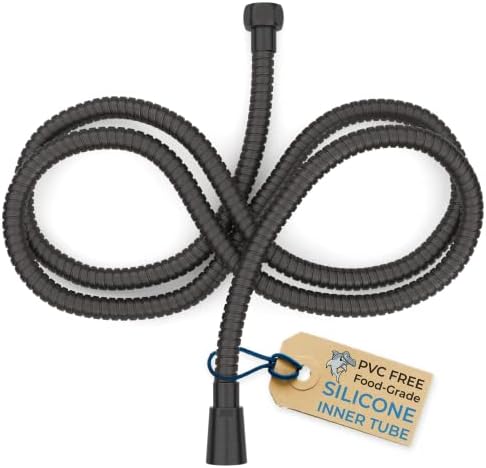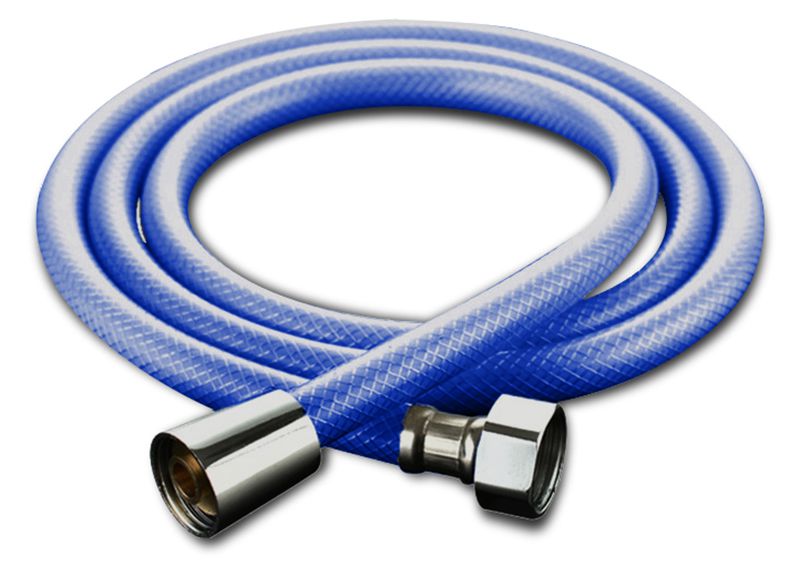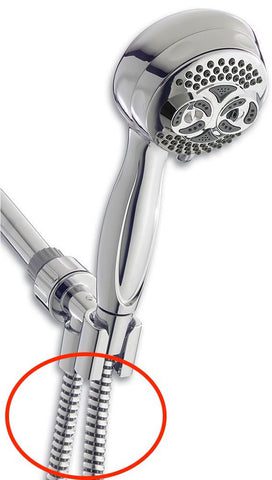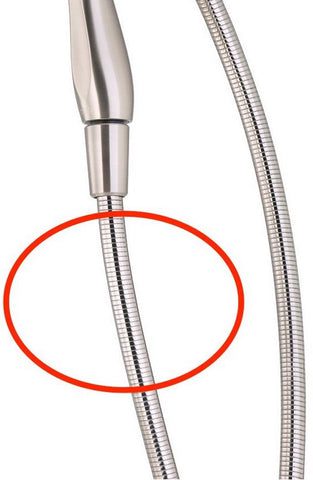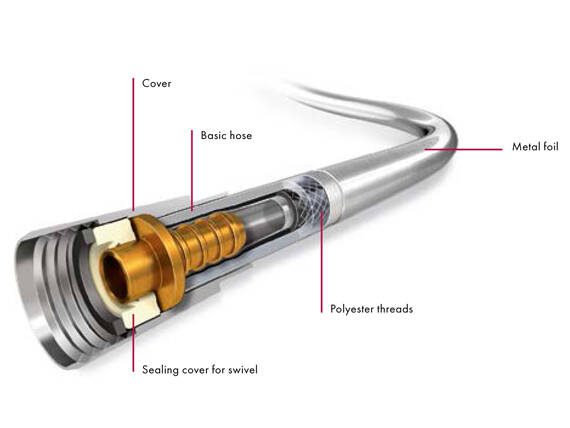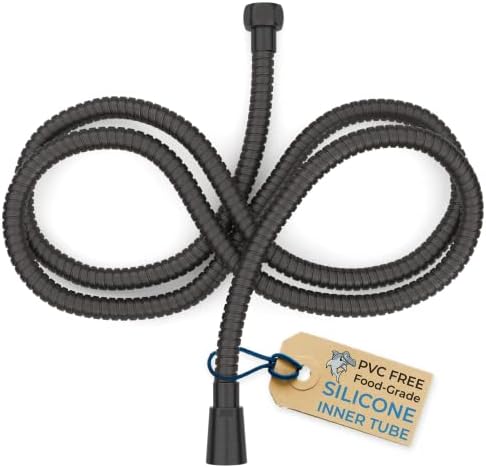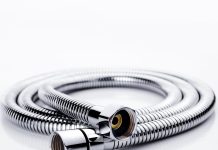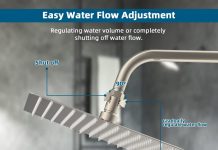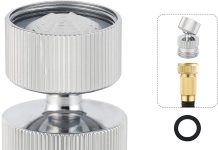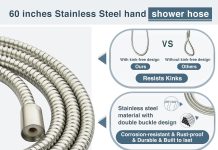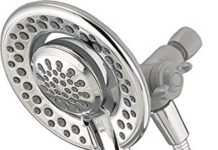If you’ve ever found yourself wondering about the differences between metal and PVC shower hoses, you’re not alone! In this article, we’ll take a closer look at these two common materials for shower hoses and explore their unique features and benefits. Whether you’re in the market for a new shower hose or simply curious about the underlying distinctions, we’ve got you covered. So, let’s get started and discover the key differences between metal and PVC shower hoses!
This image is property of www.orientflexhose.com.
Table of Contents
Durability
When it comes to durability, both metal and PVC shower hoses have their own advantages. Metal shower hoses are known for their resistance to wear and tear, making them a reliable choice that can withstand everyday use. They are less likely to break or develop leaks, ensuring a longer lifespan. On the other hand, PVC shower hoses are also known for their durability, as they are made from high-quality materials that can withstand regular use without deteriorating quickly.
In terms of resistance to corrosion, metal shower hoses have the upper hand. Due to their construction with materials like stainless steel or chrome-plated brass, they are highly resistant to rust and corrosion caused by water exposure. This makes metal shower hoses a great option for areas with hard water or higher levels of moisture. PVC shower hoses, while durable, are more prone to corrosion over time and may require regular maintenance to prevent the accumulation of mineral deposits on their surfaces.
Overall, both metal and PVC shower hoses offer durability, but metal hoses excel in terms of resistance to wear and tear as well as corrosion resistance, ensuring a longer lifespan for your shower hose.
Flexibility
Flexibility is an essential factor to consider when choosing a shower hose. Metal shower hoses are known for their ease of bending and maneuvering. They are often designed with a flexible metal coil that allows them to be easily manipulated into various positions, making it more convenient to direct the water flow during showering. On the other hand, PVC shower hoses also offer decent flexibility, allowing for comfortable showering experiences and easy handling. However, they might not be as malleable as metal hoses, which can affect their range of motion.
Another important aspect of flexibility is resistance to kinking. Metal shower hoses are less prone to kinking due to their durable construction, ensuring a smooth water flow without any interruptions. PVC shower hoses, while generally flexible, are more susceptible to kinking if not handled with care. This can lead to reduced water flow and inconvenience during showering.
In summary, both metal and PVC shower hoses offer flexibility, but metal hoses tend to have better bending maneuverability and resistance to kinking, ensuring a seamless showering experience.
Water Pressure
When it comes to water pressure, both metal and PVC shower hoses can provide a consistent water flow, contributing to an optimal shower experience. Metal shower hoses, especially those with larger diameters, are known for their ability to maintain high water pressure, providing a strong and invigorating shower. PVC shower hoses, while not as effective at maintaining high water pressure, still offer a satisfactory shower experience with a consistent flow.
It is important to note that the showerhead and the overall plumbing system also play a significant role in determining water pressure. However, the choice of shower hose can have a noticeable effect on water pressure, particularly if you have specific preferences for a certain level of water flow.
Overall, both metal and PVC shower hoses can contribute to a consistent water flow and a satisfactory shower experience, with metal hoses having a slight advantage in maintaining high water pressure.
Installation
When it comes to installation, ease and compatibility are key factors to consider. Metal shower hoses are generally easy to install, as they often come with standard fittings that can easily connect to the showerhead and the water supply. They typically require basic tools such as pliers or an adjustable wrench to tighten the fittings securely.
PVC shower hoses, on the other hand, are also relatively easy to install. They usually come with standard fittings that can be easily connected to the showerhead and water supply. However, PVC shower hoses might require extra care during installation, as they can be more prone to leaks if not properly secured. It is important to ensure a tight seal to prevent any water leakage.
In terms of compatibility with shower fixtures, both metal and PVC shower hoses are designed to fit standard showerheads and plumbing systems. However, it is always recommended to check the specifications of your showerhead and plumbing system to ensure compatibility before making a purchase.
In summary, both metal and PVC shower hoses offer ease of installation and compatibility with standard shower fixtures, with metal hoses being slightly easier to install due to their durable construction.
This image is property of cdn.shopify.com.
Price
Price is often a determining factor for many consumers when choosing a shower hose. Metal shower hoses generally come at a higher price point compared to PVC hoses. Due to their durable construction and resistance to corrosion, metal hoses are considered a premium option that offers long-term value for money. While the initial cost may be higher, their longevity and durability can outweigh the price difference in the long run.
PVC shower hoses, on the other hand, are more affordable and can be a budget-friendly option for those who are looking for a functional shower hose without breaking the bank. They offer decent durability and can last for a reasonable period if properly maintained.
While choosing a shower hose based on price is a personal decision, it is important to consider the long-term cost considerations and value for money. Investing in a higher-quality, durable shower hose like a metal hose might be a wise decision for those who prioritize longevity and durability.
Appearance
When it comes to appearance, both metal and PVC shower hoses offer their own unique features. Metal shower hoses often come in a variety of finishes such as stainless steel or chrome, offering a sleek and modern look to your bathroom. The polished surfaces of metal hoses can complement different bathroom decors, adding a touch of elegance.
PVC shower hoses, while not as visually striking as metal hoses, still come in various colors and finishes to match your bathroom decor. Whether you prefer a classic white or a vibrant color, PVC hoses can provide options to blend seamlessly with your overall bathroom design.
In summary, both metal and PVC shower hoses offer aesthetics that can enhance the overall appearance of your bathroom, with metal hoses providing a more sophisticated and modern look, while PVC hoses offer versatility in color and finish options.
This image is property of cdn.shopify.com.
Maintenance
Maintenance is an important aspect to consider when choosing a shower hose. Metal shower hoses are generally easier to clean, requiring simple wiping or occasional polishing to maintain their shine. They are also highly resistant to mold and mildew, reducing the chances of any unpleasant odors or build-up over time. Metal hoses are also resistant to stains, ensuring that they remain clean and presentable for years to come.
PVC shower hoses, while easy to maintain, may require more frequent cleaning to prevent the build-up of mold or mildew. The flexibility of PVC hoses can make it easier to wipe down and clean thoroughly. Stain resistance may vary depending on the quality of the PVC material used.
Regular cleaning and proper maintenance, regardless of the type of shower hose, are essential to ensure hygiene and longevity. By following manufacturer guidelines and adopting a cleaning routine, you can ensure that your shower hose remains in excellent condition for a longer period.
Temperature Resistance
Temperature resistance is a crucial aspect for ensuring safety and avoiding scalding incidents during showering. Metal shower hoses are known for their high-temperature tolerance, allowing them to withstand hot water without any issues. This makes them a safe option for individuals who prefer hotter showers. Additionally, metal hoses often have built-in temperature control mechanisms, such as anti-scald valves, which provide an added layer of safety.
PVC shower hoses, while capable of withstanding hot water, may have lower temperature resistance compared to their metal counterparts. It is important to choose a PVC hose with a high-temperature rating to ensure safe usage.
Safety concerns regarding temperature resistance should not be taken lightly, as scalding incidents can cause severe burns. It is always advisable to choose a shower hose that is specifically designed to handle the temperature range you prefer during showering.
This image is property of assets.hansgrohe.com.
Sound
Creating a serene and quiet showering environment is important for many individuals. Both metal and PVC shower hoses contribute to minimizing noise during operation. Metal shower hoses, due to their construction, offer better noise reduction, ensuring a peaceful shower experience. They also help minimize the water hammer effect, reducing any sudden loud noises that may occur when turning the shower on or off.
PVC shower hoses, while generally quieter compared to older plastic hoses, may produce some noise during use, particularly if the water pressure is high. However, the noise level is typically minimal and does not significantly impact the overall shower experience.
In summary, both metal and PVC shower hoses contribute to reducing noise and offer a relatively quiet operation, with metal hoses providing better noise reduction and minimizing the water hammer effect.
Eco-Friendliness
Eco-friendliness is an important consideration for many environmentally conscious individuals. Metal shower hoses are generally considered more sustainable due to the materials used in their construction, such as stainless steel or brass. These materials can be recycled, reducing the environmental impact. Additionally, metal hoses often have a longer lifespan, minimizing the need for frequent replacements and reducing waste.
PVC shower hoses, while not as inherently sustainable as metal hoses, can still be recycled if disposed of properly. However, it is important to note that PVC’s production process can have a higher environmental impact compared to metals. It is advisable to choose PVC hoses made from recycled materials to minimize the overall carbon footprint.
In summary, both metal and PVC shower hoses have their eco-friendly aspects, with metal hoses offering better sustainability in terms of materials used and recyclability.
In conclusion, when considering the difference between metal and PVC shower hoses, several factors come into play. Metal hoses excel in terms of durability, resistance to corrosion, and high-temperature tolerance, making them a reliable and safe option. They also offer an enhanced appearance with a variety of finishes to match bathroom decor. PVC hoses, on the other hand, provide flexibility, ease of installation, and affordability. They can be a budget-friendly choice that meets basic showering needs.
Ultimately, the choice between metal and PVC shower hoses depends on individual preferences and priorities. Whether you prioritize durability, appearance, or eco-friendliness, both options have their own unique benefits. It is essential to assess your specific requirements and consider factors such as water pressure, installation ease, and long-term cost considerations to make an informed decision.
This image is property of Amazon.com.

